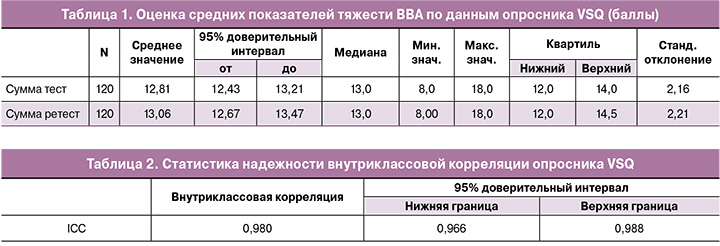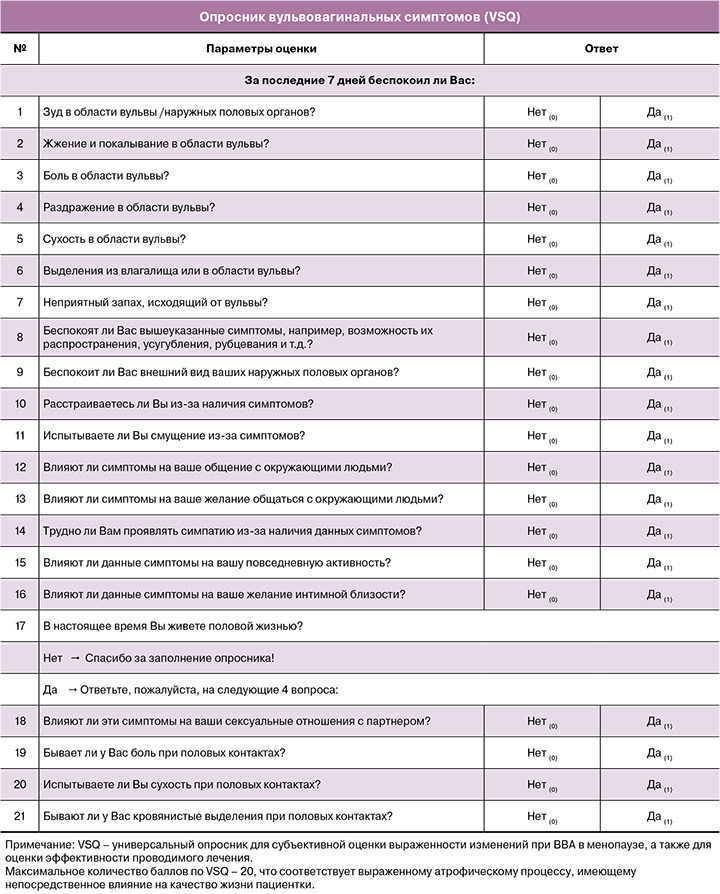Вульвовагинальная атрофия (ВВА) – одно из наиболее широко распространенных осложнений процесса репродуктивного старения. ВВА является одним из симптомов генитоуринарного менопаузального синдрома (ГУМС). Дефицит эстрогенов, возникающий в менопаузальном периоде, приводит к истончению вагинального эпителия и потере эластичности влагалищной стенки вместе с уменьшением выделений [1]. Урогенитальные симптомы – сухость влагалища, зуд, раздражение, жжение, частые обострения циститов – являются средневременными проявлениями менопаузы и усугубляются по мере снижения уровня эстрогенов [2]. ВВА часто сопровождается болевыми ощущениями при половых контактах; также сопутствуют и усугубляются такие симптомы, как гиперактивный мочевой пузырь, недержание мочи, атрофический цистоуретрит [3, 4]. Среди пациенток с ВВА чаще встречаются урогенитальные инфекции [5]. Симптомы ВВА в течение пременопаузы и постменопаузы испытывают около 50% женщин во всем мире [6].
В 2018 г. Palacios S. et al. обследовали 2160 женщин в постменопаузе, обращавшихся в гинекологические клиники. Более 90% имели по крайней мере один симптом ГУМС; среднее число симптомов в когорте составило 5. Участницы прошли объективное гинекологическое обследование; при этом атрофия была клинически диагностирована у 81% участниц. Значительно более высокие показатели вульвовагинальных и мочевых симптомов и более низкие показатели качества жизни коррелировали с более выраженными клиническими проявлениями ВВА при осмотре. Таким образом, данные свидетельствуют о том, что симптомы ВВА рассматриваются женщинами как естественные, неблагоприятные признаки старения, в связи с чем пациентки активно не предъявляют жалоб. Авторы считают, что активное выявление ранних стадий ВВА и информирование женщин об усугублении симптомов с течением времени может предотвратить появление более тяжелых проявлений ВВА (образование трещин и появление кровянистых выделений при половых контактах) [7].
Опросник VSQ разработан в 2013 г. Erekson E.A. et al. [8] в США, Йельском университете. Он предназначен для заполнения пациенткой и состоит из 21 вопроса для изучения вульвовагинальных симптомов (зуд, боль, жжение, сухость), влияния данных симптомов на эмоциональное состояние женщины, качество жизни и сексуальные отношения. Максимальное количество баллов по VSQ – 20, что соответствует выраженному атрофическому процессу, имеющему непосредственное влияние на качество жизни пациентки.
На сегодняшний день также для субъективной оценки выраженности симптомов ВВА используют опросник FSFI (Индекс женской сексуальной функции). Индекс позволяет оценить состояние сексуальной функции женщин с учетом основных составляющих – половое влечение, чувствительность и возбудимость, лубрикация, получение оргазма, удовлетворенность половой жизнью, дискомфорт/боль при коитусе или после него. В большей степени этот опросник направлен на выявление особенностей сексуальной жизни женщин. Авторы обнаружили низкую корреляцию между FSFI и VSQ [6]. Это может быть связано с различным акцентом FSFI на шести различных аспектах сексуальной функции (желание, возбуждение, лубрикация, оргазм, удовлетворение и боль), в то время как VSQ в большей степени фокусируется на симптомах ВВА – боль, кровянистые выделения и сухость при половом акте.
По нашему мнению, опросник VSQ является одним из наиболее эффективных, быстрых и простых инструментов для субъективной оценки выраженности симптомов при ВВА в менопаузе, а также для оценки эффективности проводимого лечения [8–11]. Проведя анализ источников русскоязычной литературы [12, 13], мы пришли к выводу, что опросник VSQ нашел довольно широкое применение у исследователей в нашей стране.
Однако нам не удалось найти данных о валидации этого опросника. Но следует подчеркнуть, что в статье Кузнецова И.А. и соавт. проведена языковая и культурная адаптация и валидация опросника Kujala для пациентов с болями в коленном суставе [14]; перевод и адаптация были осуществлены в 3 этапа.
Целью нашей работы явилось провести культурную, языковую адаптацию и валидацию опросника VSQ для использования у пациенток с симптомами ГУМС.
Материалы и методы
Исследование проводилось на базе ФГБУ «НМИЦ АГП им. академика В.И. Кулакова» Минздрава России в 2020–2021 гг.
Для валидации опросника были использованы международные критерии, описанные в 1993 г. Guillemin F.C. et al. [15] – использование методов прямого и обратного перевода, предварительного тестирования опросника на малой группе. В своем исследовании мы выделили 4 последовательных этапа:
1) языковая, культурная адаптация и перевод оригинальной англоязычной версии опросника VSQ на русский язык;
2) тестирование пробной версии опросника на 20 пациентках;
3) коррекция перевода;
4) сбор данных с последующей статистической обработкой и интерпретацией полученных результатов.
По аналогии с авторами [14], но применительно к нашему опроснику был сделан перевод двумя носителями русского языка: профессиональным переводчиком и врачом с уровнем владения английским языком Advanced. Далее 2 англоговорящих участника (native speaker) провели перевод русскоязычной версии на английский язык независимо друг от друга. После сравнения с оригинальной версией опросника оба варианта перевода были обсуждены совместно с переводчиками и коллективом авторов. В результате была выработана версия опросника, в наибольшей степени соответствующая смыслу и лингвистическим нормам оригинала.
Для оценки корректности формулировок русскоязычной версии опросника была проведена апробация на 20 пациентках с симптомами ВВА. После проведения пробного тестирования и внесения незначительных правок в формулировки опросника VSQ была утверждена финальная версия опросника (Приложение).
В основную группу были включены 120 пациенток с симптомами ВВА, обратившихся в отделение эстетической гинекологии и реабилитации НМИЦ АГП им. академика В.И. Кулакова с сентября 2020 г. по ноябрь 2021 г. Все пациентки подписали информированное согласие для участия в исследовании. Включенные пациентки не получали ранее лечение по поводу симптомов ВВА. Пациентки заполняли русскоязычную версию опросника VSQ дважды с интервалом 10–14 дней для определения ретестовой надежности (test-retest). Интервал был выбран с целью исключения запоминания вопросов пациентками.
Статистический анализ
Статистическая обработка полученных данных проводилась при помощи программы StatSoft STATISTICA 10.0.1011 Eneterpise (IBM, США). Для оценки ретестовой надежности мы определяли коэффициент внутриклассовой корреляции (ICC) и коэффициент α Кронбаха, отражающий внутреннюю согласованность характеристик [16].
Показатели критериальной валидности α Кронбаха, вычисленной для дихотомий или переменных, принимающих только два значения (например, для ответов истинно/ложно), идентичны так называемой формуле Кьюдера–Ричардсона-20 для надежности суммарных шкал.
Формула для вычисления коэффициента надежности:

где k – количество заданий, p – дисперсия общего балла, s – доля правильных ответов по заданию, а также доля неверных ответов по заданию.
И в том, и в другом случае, поскольку надежность вычисляется исходя из непротиворечивости всех вопросов в суммарной шкале, коэффициент надежности, вычисленный по нижеприведенной формуле, также относится к внутренне непротиворечивой надежности.
В настоящее время в публикациях, посвященных созданию, валидизации и разработке различных опросников, α Кронбаха занимает основное место для определения надежности и внутренней согласованности заданий [17]:

где k – количество заданий, во второй дроби в числителе находится сумма дисперсий всех заданий, а в знаменателе – общая дисперсия.
Результаты и обсуждение
Средний возраст пациенток составил 53 года. Наиболее распространенными жалобами являлись выраженная сухость, зуд вульвы и влагалища, диспареуния.
После проведения анкетирования исследуемой группы (n=120) средний показатель оценки тяжести ВВА составил 12,81 (от 8 до 18), медиана (Ме) и интерквартильный разброс (Q1-3) – 13 (12–14) баллов; при повторном анкетировании: средний показатель – 13,06 (от 8 до 18), Ме (Q1-3) – 13 (12–14,5) баллов (табл. 1).

На основании статистического анализа данных α Кронбаха составляет 0,983, что доказывает значительную степень внутреннего постоянства выборки. В пользу данного вывода также свидетельствуют высокие показатели ретестовой надежности (ICC >0,9) опросника (табл. 2).
В исследовании по валидации опросника HASMID-10 для пациентов с сахарным диабетом [18] авторы проводили перевод и адаптацию опросника с английского на португальский язык в 5 последовательных этапов – перевод носителями английского языка, обсуждение с исследователем, обратный перевод, консилиум исследователей и носителей английского языка, апробация опросника на малой группе. Авторы получили высокие показатели надежности и внутренней согласованности опросника: ICC=0,780, α Кронбаха=0,796.
Симптомы ВВА являются одной из самых распространенных жалоб у женщин в постменопаузе. Опросник VSQ, прошедший соответствующую всем стандартам авторскую валидацию, показал себя как надежный и эффективный инструмент оценки выраженности симптомов ВВА.
Надежность – это способность опросника давать постоянные и точные показатели. Выделяют два вида надежности: внутреннее постоянство и воспроизводимость. В нашем исследовании α Кронбаха>0,9, что соответствует высокому уровню внутреннего постоянства. Повторное анкетирование пациенток через 10–14 дней позволило дать оценку степени воспроизводимости и определить надежность русскоязычной версии опросника VSQ.
Заключение
Таким образом, полученные в ходе исследования данные коэффициента внутриклассовой корреляции и ретестовой надежности русскоязычной версии опросника VSQ дают сведения о том, что он является надежным и валидным инструментом для оценки степени тяжести симптомов ВВА, а также для оценки эффективности проводимого лечения. Данный опросник целесообразно использовать как в ходе проведения научных работ, исследований, так и в повседневной практике гинекологов, в том числе для оценки эффективности проводимой терапии.
Приложение
Данный опросник предназначен для оценки кожных симптомов в области вульвы у женщин. Кожа, окружающая влагалище, называется вульвой. Многие женщины испытывают дискомфорт в области вульвы в виде раздражения и зуда. Эти симптомы могут быть незначительными, но иногда могут быть серьезными. Ответьте на следующие вопросы о наличии/отсутствии симптомов за последнюю неделю.
Максимальное количество баллов по VSQ – 20, что соответствует выраженному атрофическому процессу, имеющему непосредственное влияние на качество жизни пациентки.




